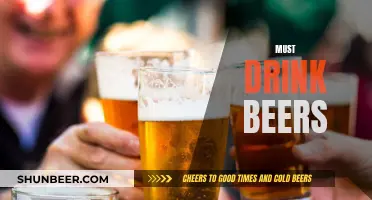
Drinking beer and building muscle is a complicated relationship. While it is true that alcohol slows muscle growth, there are ways to minimise the effects. For example, supplementing with N-acetyl cysteine (NAC) can help replenish antioxidants, while leucine can help override the inhibition of muscle building caused by alcohol. Timing your drinking can also help – research shows that alcohol decreases protein synthesis after 24 hours, so drinking on a Friday night after training is better than Saturday night.
However, it is important to note that heavy drinking can impair workout recovery and muscle growth. Alcohol is a toxin to the body and can cause inflammation and damage to the liver, as well as increase blood pressure and damage heart muscles. It can also disrupt sleep, which is crucial for muscle recovery and tissue repair.
So, while it may be tempting to reach for a beer after a workout, it is important to consume in moderation and be aware of the potential impacts on your muscle-building goals.
| Characteristics | Values |
|---|---|
| Effect on muscle protein synthesis | Heavy drinking suppresses muscle protein synthesis. Limited evidence suggests that a couple of drinks won't undo your hard work at the gym. |
| Effect on testosterone | Heavy drinking suppresses testosterone. Moderate amounts of alcohol (3-4 beers) mildly suppress testosterone when ingested daily for at least three weeks. |
| Effect on weight | Beer is calorie-dense and can lead to weight gain. |
| Effect on sleep | Alcohol can help people fall asleep but disrupts REM sleep, which is important for muscle recovery and tissue repair. |
| Effect on hydration | Beer won't negatively impact your hydration. |
| Effect on nutrition | Alcohol lacks nutritional value and impairs nutrient absorption. |
What You'll Learn

Beer can be enjoyed in moderation without negatively impacting muscle growth
However, it is important to note that excessive alcohol consumption can have negative effects on the body and hinder muscle growth. Heavy drinking can cause dehydration, weight gain, disrupted sleep, and decreased testosterone levels, all of which can impact muscle recovery and growth. Therefore, it is crucial to practice moderation and follow guidelines for healthy alcohol consumption.
To enjoy beer without hindering muscle growth, it is recommended to follow certain guidelines. Firstly, ensure proper hydration by drinking plenty of water before, during, and after consuming beer. Additionally, opt for higher-quality beverages and avoid mixed drinks or beer, as they often contain added sugars and unnecessary additives. It is also important to not substitute alcohol for sleep and to avoid drinking every day. By following these guidelines, individuals can enjoy beer in moderation while still supporting their muscle-building goals.
Overall, while excessive alcohol consumption can negatively impact muscle growth, enjoying beer in moderation can be part of a balanced and healthy lifestyle that includes exercise and proper nutrition.
Beer and GERD: What You Need to Know
You may want to see also

Alcohol impairs muscle protein synthesis
The study concluded that alcohol ingestion suppresses the anabolic response in skeletal muscle, which may impair recovery and adaptation to training and/or subsequent performance. This is supported by another study, which found that alcohol intoxication following muscle contraction decreased muscle protein synthesis but not mTOR signal transduction.
However, it is important to note that moderate alcohol consumption may not impair muscle hypertrophy and protein synthesis. A study by Steiner et al. (2015) found that moderate alcohol consumption did not prevent muscle growth or the rate of protein synthesis and mTORC1 signaling increased by overload. This study involved adult male mice that underwent unilateral functional overload of the plantaris muscle, with one group receiving a nutritionally complete alcohol-containing liquid diet and the other receiving an isocaloric, alcohol-free liquid diet.
While the evidence suggests that alcohol impairs muscle protein synthesis, the impact may vary depending on the amount and frequency of alcohol consumption, as well as individual factors.
Beer Drinking at Brimfield Fair: What's Allowed?
You may want to see also

Heavy drinking negatively impacts testosterone levels
Research has shown that heavy drinking can cause short-term and long-term changes to testosterone levels. One study found that healthy men who consumed a pint of whiskey per day for 30 days experienced a decrease in testosterone levels, reaching similar levels to those with chronic alcoholism. Long-term heavy drinking is usually defined as consuming more than 15 drinks per week for men or more than eight drinks per week for women.
Heavy drinking interferes with the production of testosterone by disrupting the hypothalamus, anterior pituitary gland, and testes, which are all necessary for testosterone synthesis. It can also damage the Leydig cells in the testes, which are responsible for testosterone production. Additionally, alcohol may interfere with the release of luteinizing hormone (LH), follicle-stimulating hormone (FSH), and gonadotropin-releasing hormone (GnRH), further impacting testosterone levels.
The negative effects of heavy drinking on testosterone levels can lead to reduced muscle mass, bone loss, infertility, and an increased risk of developing diseases such as liver disease and certain types of cancer. However, quitting drinking can naturally increase testosterone levels and improve overall health. It is important to note that moderate alcohol consumption, defined as no more than one drink per day for women or two drinks per day for men, does not seem to have long-term effects on testosterone levels.
Pumping and Drinking: Can Beer Affect Breast Milk?
You may want to see also

Alcohol can contribute to weight gain
Secondly, alcohol is high in calories but lacks essential nutrients. Alcoholic drinks are often high in "empty calories", providing little to no beneficial nutrients or minerals. These empty calories can replace the consumption of nutrient-dense foods, which are necessary for building muscle, repairing tissues, and supporting strong bones.
Thirdly, alcohol can affect hormones that control appetite, hunger, and stress. It can impair the functions of glands that release hormones, causing an imbalance that may lead to weight gain. For example, heavy drinking may activate the adrenal glands, leading to increased secretion of cortisol, a stress hormone. Elevated cortisol levels have been linked to increased abdominal weight gain and cravings for high-calorie foods.
Additionally, alcohol can make you feel hungrier and lead to cravings for salty and greasy foods. It can reduce your blood sugar levels, making you more likely to reach for unhealthy, high-carb snacks.
Finally, alcohol can disrupt your sleep quality. While it may initially help you fall asleep, it can disrupt your sleep later in the night, leading to sleep deprivation, which has been linked to weight gain.
Vaccine and Beer: What's Safe to Drink?
You may want to see also

Drinking beer can be socially beneficial for bodybuilders
Secondly, drinking beer in moderation can be a way for bodybuilders to unwind and relax after an intense workout. Beer is often associated with social gatherings and celebrations, and having a beer with friends can be a rewarding experience that contributes to a positive mental state. This can be especially beneficial for bodybuilders, as mental health is an important aspect of overall well-being and can impact motivation and consistency in their training regimen.
Additionally, drinking beer in moderation can be a way for bodybuilders to treat themselves and enjoy a sense of indulgence without completely derailing their progress. Beer, when consumed in limited quantities, may not have a significant negative impact on muscle growth and can be part of a balanced diet and fitness routine. However, it is important to emphasize that excessive drinking can lead to negative health consequences and hinder bodybuilding progress.
Finally, drinking beer in social settings can expose bodybuilders to a diverse group of people with varying interests and hobbies. This can lead to the development of new friendships and connections outside of the bodybuilding community, fostering a sense of community and belonging. Socializing in a casual setting can also help bodybuilders develop their interpersonal skills and build confidence, which can positively impact their overall well-being.
Beer and TB Testing: What You Need to Know
You may want to see also
Frequently asked questions
Yes, it is possible to build muscle and drink beer, but only if done in moderation. Excessive drinking can lead to dehydration, weight gain, disrupted muscle growth, and interrupted sleep, all of which can hinder muscle growth and repair.
Beer consumption can disrupt muscle protein synthesis and muscle growth. Studies have shown that alcohol blocks muscle-building at the genetic level and may even suppress testosterone, a key hormone in muscle growth.
Moderate drinking is defined as 1 beer per day for women and up to 2 beers per day for men. Anything more than this can be considered excessive and may negatively impact muscle growth and overall health.
Beer contains energy-promoting B vitamins and quickly absorbed carbohydrates, which can provide a boost of energy. Additionally, the social aspect of moderate drinking can help individuals stick to their fitness routines and create a support system.
Yes, supplements such as N-acetyl cysteine (NAC) and leucine can help reduce the negative impact of alcohol on muscle growth. NAC helps replenish antioxidants, while leucine can help override the inhibition of muscle-building caused by alcohol.







